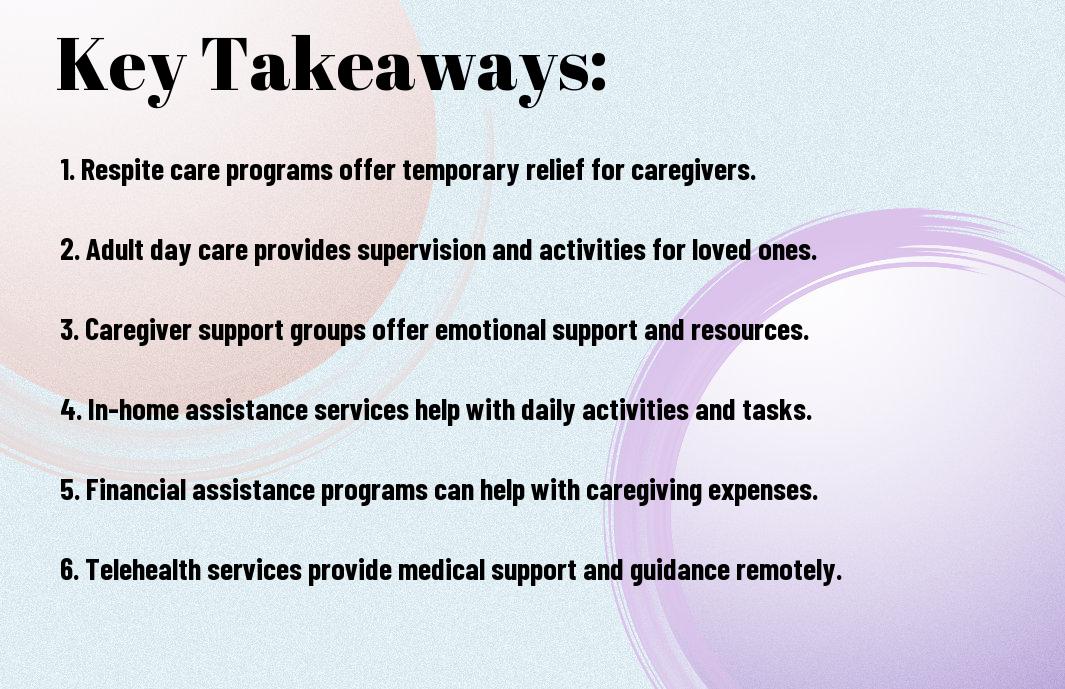It’s necessary for family caregivers to be aware of the variety of assistance programs that can support them in their vital role. From respite care services to counseling and training programs, these resources can provide much-needed help and relief for those caring for their loved ones. By understanding what options are available, caregivers can better navigate the challenges they may face and ensure they are equipped with the necessary support to fulfill their caregiving responsibilities effectively.
Key Takeaways:
- Wide Range of Programs: Family caregiver assistance programs offer a variety of services to support caregivers in their important role.
- Respite Care: These programs often provide respite care to give caregivers a break and prevent burnout.
- Training and Education: Many caregiver assistance programs offer training and educational resources to help caregivers develop necessary skills.
- Financial Assistance: Some programs provide financial aid to offset the costs associated with caregiving, such as medication and medical supplies.
- Emotional Support: Caregiver assistance programs offer emotional support to help caregivers cope with the stress and emotional challenges of caregiving.


Federal Programs
Before delving into the various federal programs available to assist family caregivers, it is important to note the resources offered by the Family Caregiver Support – California Department of Aging. This program provides a range of services to support family caregivers, including information and referral, counseling, support groups, and respite care assistance.
National Family Caregiver Support Program
One significant federal program designed to aid family caregivers is the National Family Caregiver Support Program. Administered by the Administration for Community Living, this program provides grants to states and territories to fund a variety of supportive services for caregivers. These services can include information to caregivers about available services, assistance to caregivers in gaining access to supportive services, counseling, support groups, and respite care.
Veterans Administration Caregiver Support
With a focus on supporting family caregivers of veterans, the Veterans Administration Caregiver Support program offers a range of services to help caregivers provide care for their veteran loved ones. These services include monthly stipends, access to healthcare coverage, mental health counseling, caregiver training, and respite care. In addition, the program offers a helpline and online support for caregivers to access information and resources.
The Veterans Administration Caregiver Support program recognizes the invaluable role that family caregivers play in supporting veterans and aims to provide comprehensive support to ensure the well-being of both the caregiver and the veteran. By offering a range of services tailored to the unique needs of military caregivers, this program helps to alleviate some of the challenges that caregivers may face in their caregiving journey.

State-Specific Programs
Medicaid Waiver Programs
It is vital for family caregivers to be aware of the Medicaid waiver programs available in their state. These programs provide assistance to individuals who require a level of care typically provided in a nursing home but prefer to receive that care at home. Medicaid waivers cover services such as personal care, respite care, adult day care, and home modifications to make the living environment safer and more accessible for the care recipient.
An example of a Medicaid waiver program is the Home and Community-Based Services (HCBS) waiver. This program allows states to tailor their services to meet the specific needs of their population. Eligibility criteria vary by state, so it is crucial for caregivers to research and understand the requirements to access these valuable services.
By taking advantage of Medicaid waiver programs, family caregivers can alleviate some of the financial burdens associated with providing care for their loved ones at home. These programs not only support the care recipient in maintaining their independence but also assist caregivers in managing their responsibilities effectively.
State-Based Respite Care Programs
One of the most beneficial resources for family caregivers is state-based respite care programs. These programs offer temporary caregiving services to provide caregivers with a much-needed break from their responsibilities. Respite care services can include in-home care, adult day care, or short-term stays in a facility, allowing caregivers to recharge and attend to their own needs.
One notable example of a state-based respite care program is the Lifespan Respite Care Program, which aims to enhance the overall well-being of both the caregiver and care recipient. These programs recognize the critical role that caregivers play in the healthcare system and provide them with the support and rest they need to continue providing quality care to their loved ones.
Another benefit of state-based respite care programs is the peace of mind they offer to family caregivers. Knowing that they have access to temporary care services allows caregivers to schedule breaks and take care of their physical and emotional health, ultimately benefiting both the caregiver and the care recipient.
Private Organizations and Resources
For Get paid as a caregiver for a family member, there are various private organizations and resources available to assist family caregivers. These entities offer support, information, and sometimes financial assistance to help lessen the burden on those taking care of loved ones.
AARP Caregiving Initiative
One of the prominent organizations dedicated to supporting family caregivers is the AARP Caregiving Initiative. This program provides a wealth of resources, including online articles, webinars, and local events tailored to caregivers’ needs. AARP offers guidance on navigating the healthcare system, managing stress, and accessing community support services. Additionally, they advocate for caregiver-friendly policies at the state and federal levels to improve the overall caregiving experience.
National Alliance for Caregiving
The National Alliance for Caregiving is another valuable resource for family caregivers. This nonprofit organization conducts research on caregiving issues and provides educational materials and tools to support caregivers in their roles. They collaborate with government agencies, healthcare providers, and other organizations to raise awareness about caregivers’ needs and promote policies that support them. The National Alliance for Caregiving also offers training programs and hosts events to empower caregivers with knowledge and skills to provide the best possible care for their loved ones.
Plus, the National Alliance for Caregiving advocates for caregivers’ rights and recognition, working to ensure that caregivers receive the support and resources they need to maintain their physical and mental well-being. Through partnerships with healthcare professionals and policymakers, they strive to create a more caregiver-friendly environment that values and appreciates the vital role caregivers play in society.
Summing up
Conclusively, there are various family caregiver assistance programs available to support individuals who take care of their loved ones. These programs can offer financial assistance, respite care, counseling services, and educational resources to help caregivers navigate their important role effectively. It’s crucial for family members to explore these programs and take advantage of the support they provide to avoid burnout and ensure the well-being of both the caregiver and the care recipient.
By understanding the different types of assistance programs available, caregivers can better tailor their support system to meet their specific needs. Whether it’s through government-funded programs, nonprofit organizations, or community-based services, there are resources out there to help lighten the caregiving load and provide important tools and guidance. Educating oneself about these programs is the first step towards creating a sustainable and fulfilling caregiving experience.
Overall, family caregiver assistance programs play a vital role in recognizing and valuing the hard work and dedication of caregivers. By offering a range of support services, these programs aim to alleviate the challenges and stresses that caregivers face on a daily basis. It’s important for caregivers to proactively seek out these resources and take care of their own well-being while taking care of others. Through these programs, caregivers can find the help they need to continue providing quality care for their loved ones while maintaining their own health and happiness.
FAQ
Q: What family caregiver assistance programs are available?
A: Family caregiver assistance programs include respite care, support groups, counseling, educational resources, and financial assistance. These programs aim to provide comprehensive support to individuals taking care of their loved ones.
Q: How can family caregivers benefit from respite care programs?
A: Respite care programs offer family caregivers the opportunity to take a break from their caregiving responsibilities. This temporary relief allows caregivers to recharge, reduce stress, and avoid burnout, ultimately improving the quality of care they provide.
Q: What types of support groups are available for family caregivers?
A: Family caregivers can join support groups tailored to their specific caregiving situations, such as groups for Alzheimer’s caregivers, cancer caregivers, or veteran caregivers. These support groups provide a platform for caregivers to connect with others facing similar challenges, share experiences, and gain valuable insights.
Q: How can family caregivers access counseling services?
A: Family caregivers can access counseling services through local organizations, healthcare providers, or online platforms. Counseling can help caregivers navigate the emotional challenges of caregiving, develop coping strategies, and enhance their overall well-being.
Q: Are there financial assistance programs available for family caregivers?
A: Yes, there are financial assistance programs available for family caregivers, such as Medicaid waivers, caregiver stipends, and grants. These programs can help alleviate the financial burden of caregiving by providing financial support for caregiving-related expenses.



